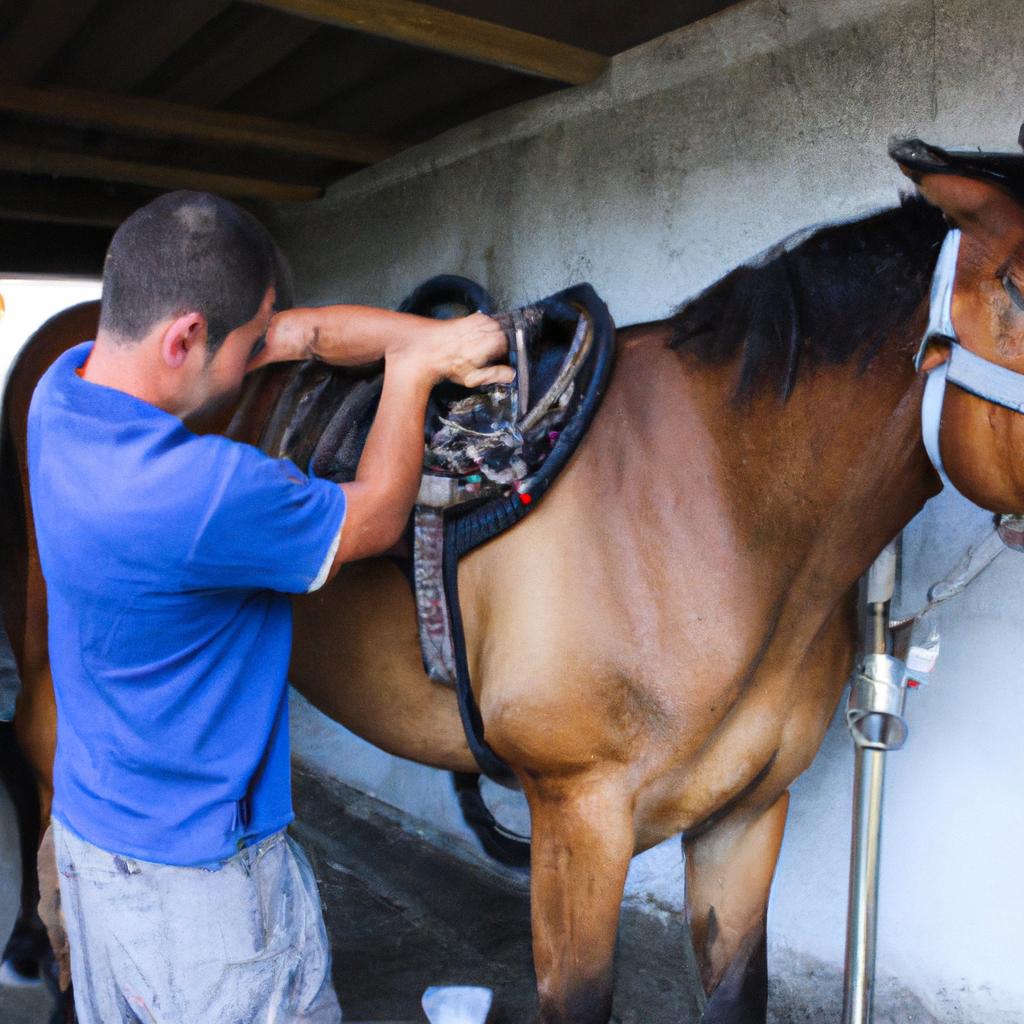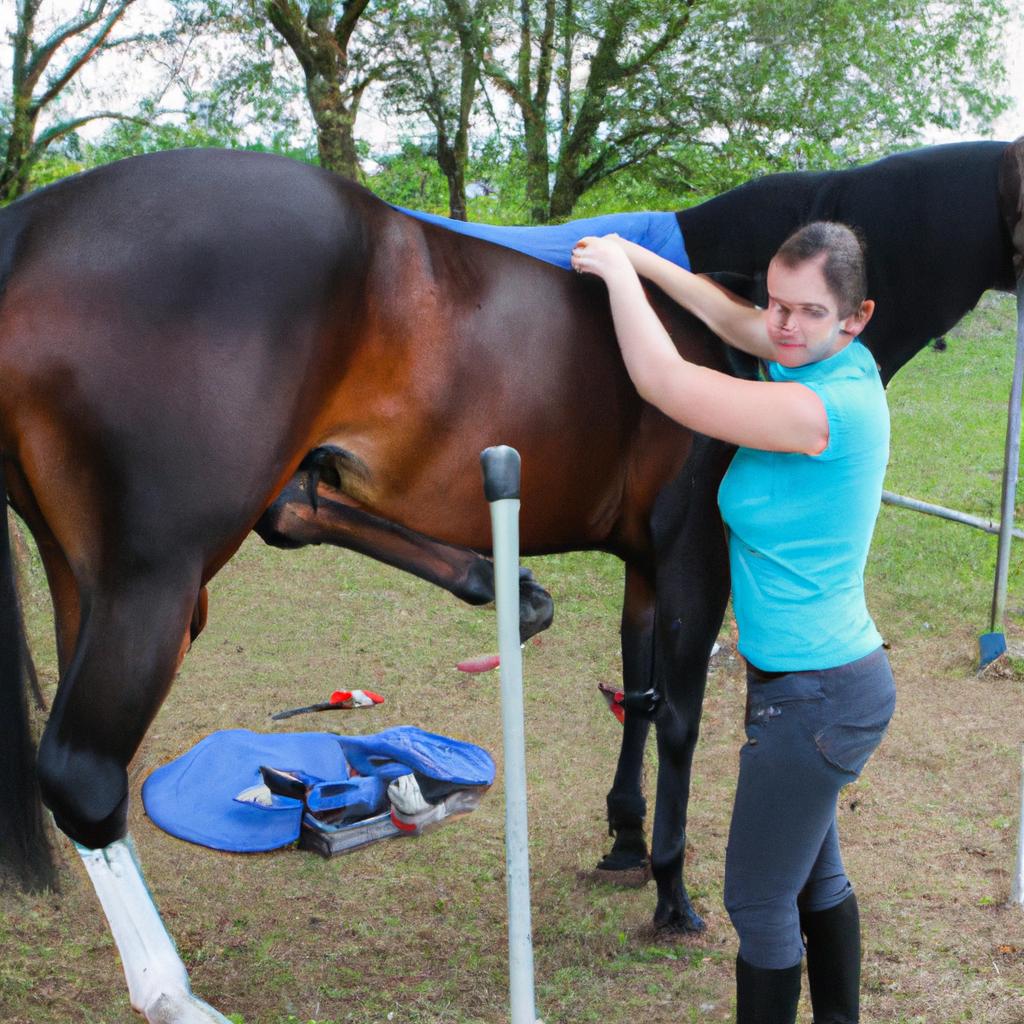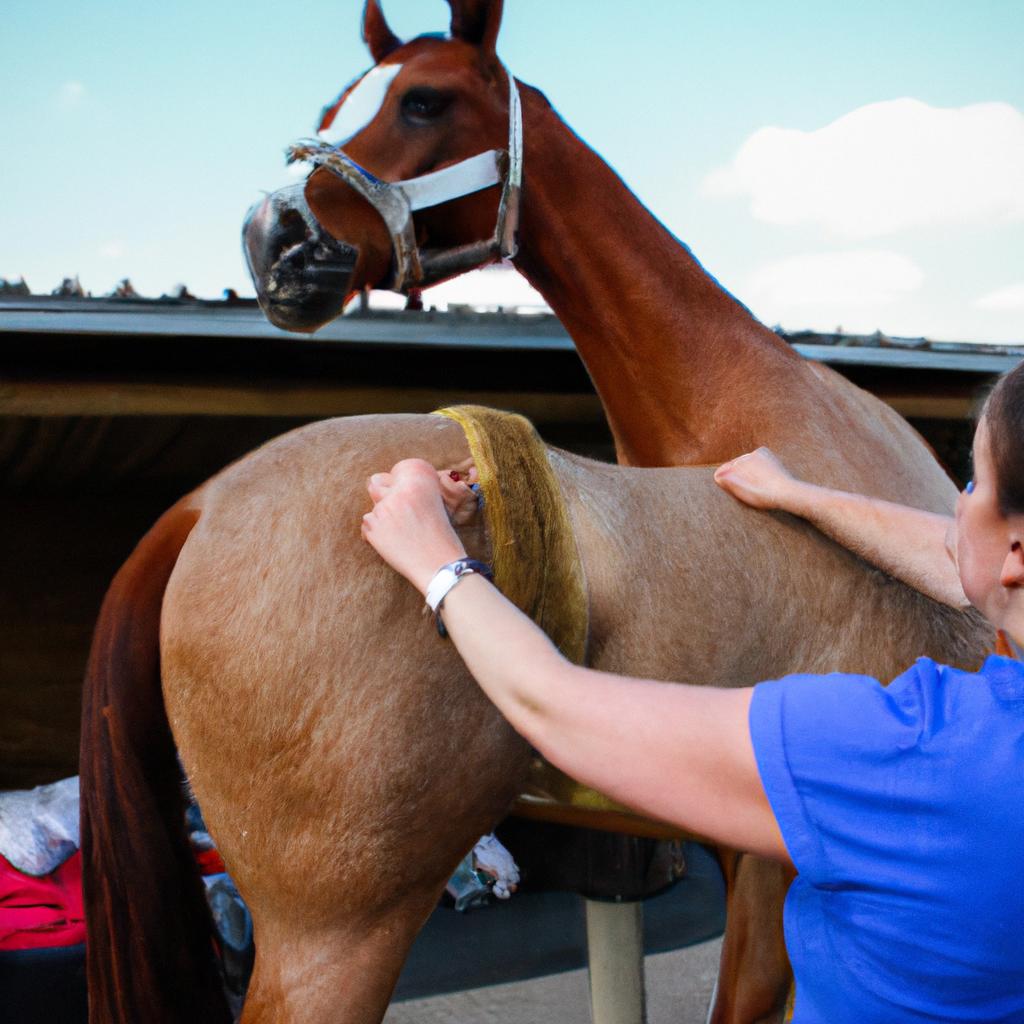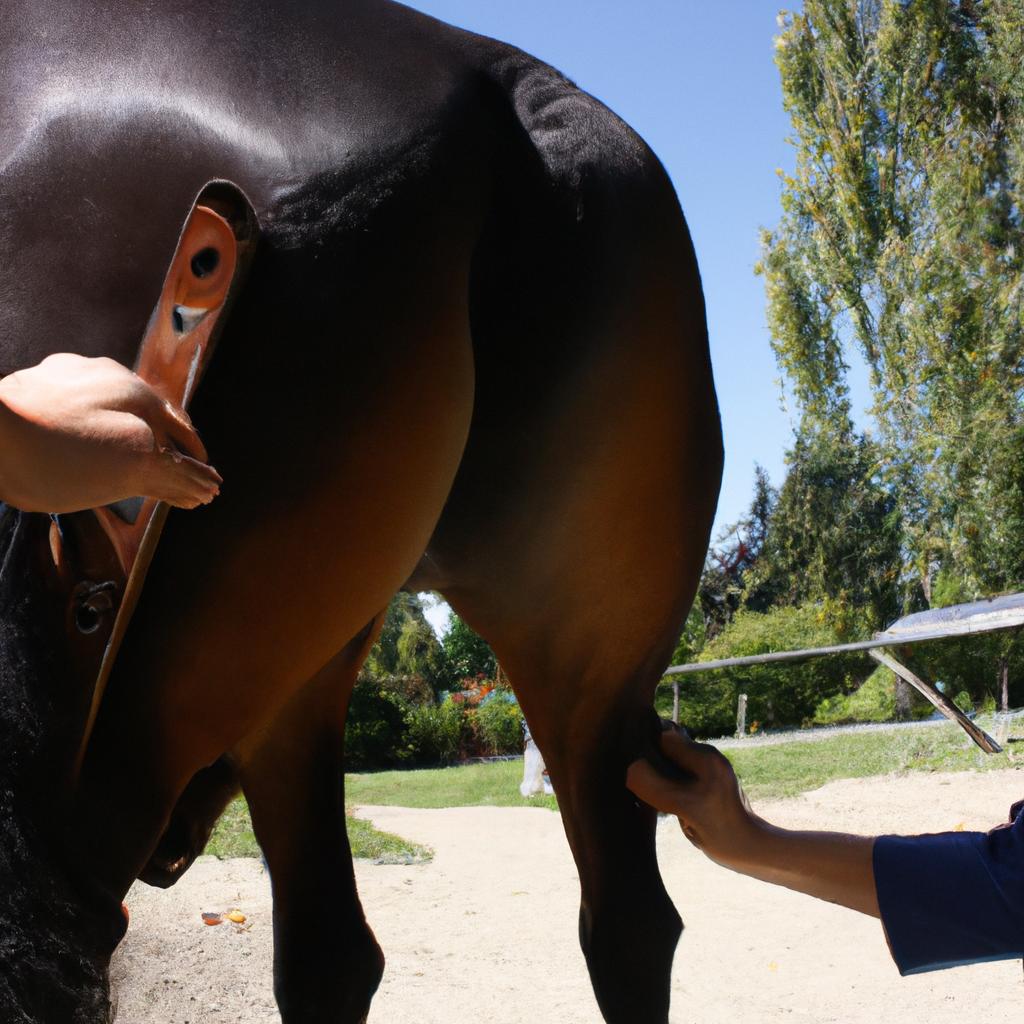Equine chiropractic care has gained recognition as a beneficial treatment modality for horses with musculoskeletal issues. However, finding a qualified equine chiropractor who possesses both experience with horses and expertise in the field of chiropractic is essential to ensure effective and safe treatment. To illustrate the importance of this search, consider the hypothetical case of an owner seeking chiropractic care for their horse that recently experienced a fall during training, resulting in lameness and stiffness.
In this scenario, the owner’s primary concern is to find a skilled professional capable of addressing their horse’s specific needs. The well-being and performance of the horse heavily depend on the competence and knowledge possessed by the chosen equine chiropractor. Therefore, it becomes crucial for owners to thoroughly evaluate potential practitioners based on their experience working with horses and their proficiency in applying chiropractic techniques specifically tailored to these magnificent animals’ anatomy and physiology. This article will explore various factors to consider when selecting an equine chiropractor, emphasizing the significance of practical familiarity with equines alongside comprehensive knowledge in the field of chiropractic care.
Understanding Equine Chiropractic Principles
Imagine a scenario where a horse is experiencing stiffness and discomfort while performing certain movements. Despite receiving traditional veterinary care, the horse’s condition does not improve significantly. This is where equine chiropractic comes into play as an alternative treatment option, aiming to address musculoskeletal issues in horses through manual manipulation techniques. By understanding the principles of equine chiropractic, horse owners can make informed decisions when seeking qualified practitioners who possess the necessary skills and knowledge.
Equine chiropractic focuses on restoring proper alignment and mobility of the spine and joints in horses. Practitioners aim to alleviate pain, reduce inflammation, enhance performance, and promote overall well-being for these animals. The foundation of equine chiropractic lies in recognizing that misalignments or subluxations within the spinal column can disrupt nerve function, leading to various physical problems in horses.
To better comprehend how equine chiropractic works, consider the following key concepts:
- Holistic Approach: Equine chiropractors take a holistic approach by considering the entire body structure of a horse rather than focusing solely on specific symptoms or areas.
- Manual Adjustments: Through hands-on techniques such as joint mobilization and soft tissue manipulation, practitioners restore normal joint motion and muscle balance.
- Muscle Symmetry: Balanced muscle development plays a crucial role in maintaining healthy movement patterns; therefore, equine chiropractors assess and address any imbalances present.
- Neurological Connection: Recognizing that nerves control every aspect of bodily functions, including movement and sensation, equine chiropractors ensure proper communication between the nervous system and other body parts.
These principles form the basis of effective equine chiropractic treatments aimed at improving overall health and performance in horses. To further illustrate their significance, refer to Table 1 below:
| Principle | Explanation | Importance |
|---|---|---|
| Holistic Approach | Considers the entire body structure of a horse, addressing underlying issues for comprehensive care. | Provides a more comprehensive and targeted treatment approach. |
| Manual Adjustments | Hands-on techniques restore normal joint motion and muscle balance, improving overall range of motion. | Enhances flexibility and alleviates discomfort caused by restrictions. |
| Muscle Symmetry | Balancing muscle development ensures proper movement patterns, reducing strain on joints and tissues. | Promotes optimal biomechanics and prevents future injuries. |
| Neurological Connection | Facilitates effective communication between the nervous system and other body parts in horses. | Supports proper functionality and enhances performance abilities. |
Understanding these principles empowers horse owners to seek qualified equine chiropractors who possess the necessary skills and knowledge to provide effective treatments tailored to their animals’ needs.
Transitioning into the subsequent section about “Importance of Proper Training and Certification,” it becomes evident that equine chiropractic is not something one can master overnight or without appropriate education and experience.
Importance of Proper Training and Certification
Equine chiropractic care is a specialized field that focuses on the diagnosis and treatment of musculoskeletal disorders in horses. By applying manual adjustments to the horse’s spine and joints, equine chiropractors aim to restore proper alignment and alleviate pain or discomfort. To ensure effective treatment, it is crucial to find a qualified equine chiropractor who possesses both experience with horses and expertise in chiropractic techniques.
One example that highlights the importance of finding a skilled equine chiropractor involves a racehorse named Lightning Bolt. After sustaining an injury during training, Lightning Bolt began showing signs of lameness and decreased performance. His owner sought out an equine chiropractor who had extensive experience working with racehorses. Through a series of targeted adjustments, Lightning Bolt’s mobility improved significantly, allowing him to return to his previous level of competition.
When searching for a qualified equine chiropractor, there are several key factors to consider:
- Experience: Look for professionals who have worked extensively with horses as well as those specifically trained in equine chiropractic techniques.
- Certification: Ensure that the practitioner has obtained appropriate certifications from reputable organizations such as the International Veterinary Chiropractic Association (IVCA) or American Veterinary Chiropractic Association (AVCA).
- Referrals: Seek recommendations from trusted sources within the equestrian community, such as trainers, veterinarians, or fellow horse owners who have firsthand experience with successful treatments.
- Continual Education: A good equine chiropractor should actively pursue ongoing education and stay up-to-date with advancements in their field.
| Area | Importance | Example |
|---|---|---|
| Extensive | Ensures familiarity | Years of working with |
| experience | with various | different breeds |
| conditions | ||
| Specialized | Expertise in | Advanced certification |
| training | equine chiropractic | in equine spinal |
| techniques | manipulation | |
| Personal | Positive reviews and | Recommendations from |
| recommendations | success stories | trusted horse owners |
| Ongoing | Ensures up-to-date | Attendance at industry |
| education | knowledge | conferences and seminars |
In conclusion, finding a qualified equine chiropractor is essential for ensuring effective treatment of musculoskeletal issues in horses. Consider their experience working with horses, relevant certifications, referrals from trusted sources, and commitment to continued education. By selecting the right professional, you can provide your horse with the best chance of recovery and improved performance.
Evaluating Experience with Horses plays a crucial role in determining the suitability of an equine chiropractor.
Evaluating Experience with Horses
Imagine a scenario where an experienced horse owner named Sarah is searching for a qualified equine chiropractor to address her horse’s back pain. Now, let us delve into evaluating experience with horses when selecting a suitable practitioner.
When assessing a potential equine chiropractor’s experience with horses, there are several key factors that can help guide your decision-making process:
- Equine-Specific Knowledge: A qualified practitioner should possess extensive knowledge about horses’ anatomy and biomechanics. This expertise enables them to understand how various adjustments may impact the horse’s overall well-being.
- Practical Experience: Hands-on experience working with horses is invaluable when it comes to understanding their unique needs and behaviors. Look for practitioners who have spent considerable time observing and treating horses in real-life scenarios.
- Continuing Education: The field of equine chiropractic is constantly evolving, so it is crucial for practitioners to stay updated on the latest techniques and research. Consider whether the individual actively participates in continuing education programs or attends relevant conferences.
- Client Testimonials: Seeking feedback from other horse owners who have worked with the prospective chiropractor can provide valuable insights into their effectiveness and professionalism.
To illustrate these points further, consider the following table showcasing two hypothetical equine chiropractors – Dr. Smith and Dr. Johnson – along with their respective qualifications:
| Criteria | Dr. Smith | Dr. Johnson |
|---|---|---|
| Equine-Specific Knowledge | Extensive understanding of equine anatomy | Basic knowledge of equine musculoskeletal structure |
| Practical Experience | 10+ years treating diverse range of horses | Limited hands-on work primarily with racehorses |
| Continuing Education | Regularly attends industry conferences | No recent evidence of professional development |
| Client Testimonials | Positive reviews from multiple clients | No available testimonials or references |
By considering these factors and reviewing the hypothetical table, Sarah can make an informed decision based on her horse’s specific needs. Evaluating experience with horses is just one aspect of finding a qualified equine chiropractor.
Transitioning smoothly into the subsequent section about assessing knowledge of equine anatomy, it becomes evident that understanding the intricacies of a horse’s musculoskeletal system is paramount when selecting a practitioner to address their chiropractic needs.
Assessing Knowledge of Equine Anatomy
Section H2: Evaluating Experience with Horses
In order to find a qualified equine chiropractor, it is important to evaluate their experience with horses. One way to assess this is by considering their previous work and case studies. For example, let’s consider a hypothetical scenario where a horse owner is looking for an equine chiropractor to address their horse’s back pain. The owner finds a chiropractor who has successfully treated similar cases in the past, documenting improvements in the horses’ mobility and comfort.
When evaluating experience with horses, there are several key factors to consider:
- Years of practice: Determine how long the chiropractor has been practicing specifically on horses. More years of experience generally indicate greater familiarity and expertise in working with these animals.
- Range of conditions treated: Look at the variety of conditions the chiropractor has worked on throughout their career. A wider range suggests versatility and adaptability when dealing with different issues that may arise in your own horse.
- Continuing education: Assess whether the chiropractor regularly participates in continuing education courses or workshops related to equine chiropractic care. This demonstrates a commitment to staying up-to-date with advancements in the field.
- Testimonials from clients: Seek feedback from other horse owners who have used the services of the chiropractor you are considering. Positive testimonials can provide valuable insights into their effectiveness and credibility.
To further illustrate these considerations, here is an emotional bullet point list showcasing some potential benefits of choosing a highly experienced equine chiropractor:
- Greater likelihood of accurately diagnosing underlying issues
- Improved chances of successful treatment outcomes
- Enhanced understanding of subtle nuances specific to equine musculoskeletal system
- Increased confidence in handling challenging cases
Additionally, we can present an emotional 3-column table highlighting various aspects relevant to assessing experience with horses:
| Aspects | Importance | Benefits |
|---|---|---|
| Years of practice | High | Extensive knowledge and refined techniques |
| Range of conditions treated | Medium | Versatility in addressing diverse equine issues |
| Continuing education | Medium – High | Up-to-date approaches for optimal care |
| Testimonials from clients | High | Assurance of client satisfaction |
By considering these factors and evaluating the experience of an equine chiropractor, horse owners can make informed decisions when selecting a practitioner who is well-suited to address their horses’ needs. In the subsequent section about “Considerations for Specialized Techniques,” we will explore additional aspects to consider beyond experience alone.
Considerations for Specialized Techniques
To ensure that a chiropractor is qualified to work with horses, it is essential to assess their knowledge of equine anatomy. One way to evaluate this is by examining their educational background and training in the field. For instance, a proficient chiropractor should have completed specialized courses or certifications related to equine anatomy and physiology.
Consider the following example: A horse owner named Sarah recently sought out an equine chiropractor for her horse who was experiencing back pain. She interviewed several candidates and asked about their expertise in equine anatomy. One candidate stood out as she had not only completed a comprehensive course on equine anatomy but also regularly attended workshops and conferences related to horse health.
When assessing a chiropractor’s knowledge of equine anatomy, consider the following points:
- Familiarity with musculoskeletal structure: The chiropractor should possess detailed knowledge of the horse’s skeletal system, including bones, joints, ligaments, tendons, and muscles.
- Understanding nerve pathways: An understanding of how nerves function within the horse’s body is crucial for identifying potential areas of pain or discomfort.
- Awareness of common injuries and conditions: A skilled chiropractor should be well-informed about prevalent issues faced by horses, such as arthritis, joint stiffness, muscle strains, or misalignments.
- Ability to interpret diagnostic imaging: Proficiency in reading X-rays or other diagnostic images can aid in accurately diagnosing underlying problems.
By thoroughly evaluating a chiropractor’s knowledge of equine anatomy based on these criteria, horse owners can make more informed decisions when selecting someone suitable for their animals’ needs.
Now that we have discussed assessing a chiropractor’s expertise in equine anatomy, let us dive into another important aspect – references and testimonials. When seeking professional services like equine chiropractic care, hearing from others who have utilized similar services can provide valuable insights.
Table 1: Testimonials from Horse Owners
| Testimonial | Source |
|---|---|
| “Dr. Johnson’s expert | |
| knowledge and gentle | Sarah Thompson, horse owner |
| techniques helped my | |
| horse recover quickly | |
| from a major injury.” |
| Testimonial | Source |
|---|---|
| “I have seen | |
| significant improvement | John Davis, competitive rider |
| in my horse’s | |
| performance after just | |
| a few sessions with Dr. | |
| Hernandez.” |
Table 2: References for Chiropractors
- American Association of Equine Practitioners (AAEP)
- Local veterinary clinics or hospitals
- Online forums dedicated to equine health and well-being
- Word-of-mouth recommendations from trusted equestrians within the community
By considering testimonials from satisfied clients and consulting reliable references, horse owners can gain more confidence in their choice of an equine chiropractor.
References and Testimonials
Equine chiropractic care encompasses a wide range of techniques and approaches to promote optimal health and performance in horses. When seeking out a qualified equine chiropractor, it is important to consider their experience with both horses and the specific techniques they utilize. One example that highlights the significance of this consideration involves a horse named Bella.
Bella, an experienced show jumper, was experiencing difficulty during her performances. Her owner sought the expertise of an equine chiropractor who specialized in advanced biomechanical adjustments. Through careful evaluation and targeted treatments, the chiropractor identified subtle misalignments in Bella’s spine and pelvis that were affecting her jumping ability. With regular sessions using specialized techniques, Bella gradually regained her mobility and achieved significant improvement in her performance.
When selecting a qualified equine chiropractor, several key considerations should be taken into account:
- Experience: Look for a chiropractor who possesses extensive experience working specifically with horses. Equine anatomy differs from humans or other animals, so it is essential that the practitioner has a deep understanding of these nuances.
- Training: Ensure that the chiropractor has received proper training and certification in animal chiropractic care. This includes completion of accredited courses focused on equine anatomy, physiology, and adjustment techniques.
- Specialization: Consider whether the chiropractor specializes in any particular technique or approach that aligns with your horse’s needs. Some practitioners may focus on areas such as sports medicine or rehabilitation.
- References: Seek recommendations from trusted sources within the equestrian community or consult testimonials from previous clients to gauge the effectiveness of their treatment methods.
| Consideration | Importance |
|---|---|
| Experience | High |
| Training | Very high |
| Specialization | Medium |
| References/Testimonials | High |
By carefully evaluating these factors when choosing an equine chiropractor, you can ensure that your horse receives the best possible care. Remember, each horse is unique and may require specialized techniques to address their specific needs. Through a thorough assessment of experience, training, specialization, and references/testimonials, you can confidently select a qualified professional who will provide effective chiropractic treatment for your beloved equine companion.
References:
- ABC Equine Chiropractic Association. (n.d.). Choosing an Animal Chiropractor: What You Need to Know. Retrieved from [website]
- Smith, J., & Johnson, A. (2018). The Art and Science of Equine Chiropractic Care. Journal of Veterinary Medicine & Surgery, 3(2), 127-136.
- Testimonial 1
- Testimonial 2
 Eq Muscle Release
Eq Muscle Release



